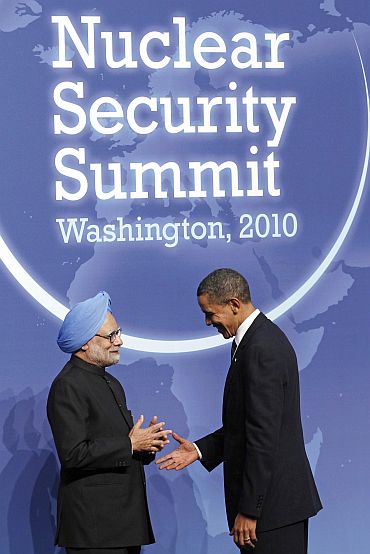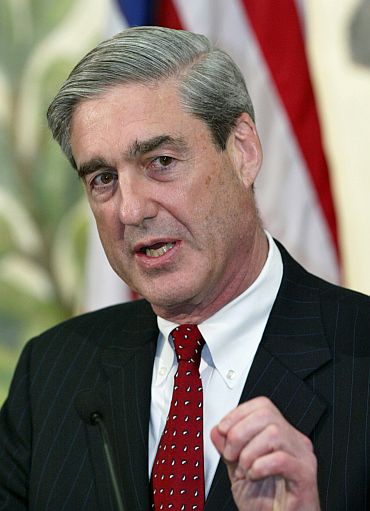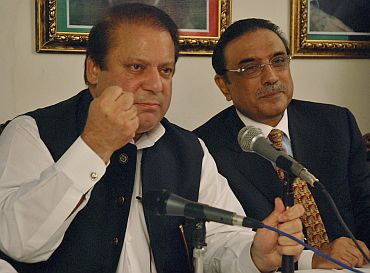Photographs: Kevin Lamarque/Reuters
As Federal Bureau of Investigation Director Robert Mueller headed towards Islamabad after his successful New Delhi visit, a top US diplomat cautioned him about the tough time they were experiencing inside Pakistan mainly because of the growing US-India relationship.
A secret American diplomatic cable dated February 22, 2010 coming out of the US embassy in Islamabad and addressed to Mueller, who was then in New Delhi, said that cooperation has frequently been hampered by suspicion in Pakistan military and intelligence establishment about US intentions and objectives.
"Among other things, the Pakistanis believe that we have favoured India over Pakistan -- most notably, by approving civil-nuclear cooperation with India -- and that we aim to dismantle Pakistan's nuclear weapons program, which, in light of their conventional military disadvantage vis-a-vis India, they consider critical to their national security," the US cable, which was released by whistleblower website WikiLeaks, said.
..
Miffed Pak army hampered US embassy operations
Image: Federal Bureau of Investigation Director Robert MuellerPhotographs: Reuters
"The military and intelligence establishment is also concerned that we are working with Pakistan's civilian leadership to limit the military's prerogative in determining Pakistan's national security policies. As a result of these concerns, the military and intelligence establishment has taken steps since spring 2009 to hamper the operations of the embassy," it said.
The steps included holding up the issuance and renewal of Pakistani visas for permanent embassy staff, denying import permits for armoured vehicles for embassy use, sabotaging contract to provide enhanced protective support for Consulate General Peshawar personnel among others.
Other hurdles posed by the Pakistani authorities to US officials include shutting down its Anti-Terrorism Assistance training program at Pakistan's Sihala police academy, putting up roadblocks for acquiring additional land for the embassy's expansion and harassing embassy personnel by stopping and detaining embassy vehicles.
"Some of these problems have recently abated in response to our repeatedly raising them with the highest levels of the Pakistani government. However, we expect we will have to continue to push back against such impediments for the foreseeable future," the cable said.
It said Pakistan has experienced an alarming increase in terrorist attacks against government and civilian targets in Pakistan's major cities, resulting in several hundred deaths in recent months. Muller was advised to acknowledge the sacrifices made by Pakistan's law enforcement agencies and the pressure the terrorist attacks have placed on their resources.
US was also worried over Zardari's 'uncertainty'
Image: Pakistan's former PM Nawaz Sharif speaks during joint news conference with Zardari in IslamabadPhotographs: Reuters
The FBI director was also told by the US embassy in Islamabad that domestic politics is dominated by uncertainty about the fate of President Asif Ali Zardari.
"He enjoys approval ratings in the 20 per cent range and has repeatedly clashed with key power centers, including the military, politically ambitious Supreme Court Chief Justice Iftikhar Chaudhry, and opposition leader Nawaz Sharif," it said.
In December, the Supreme Court ruled unconstitutional the November 2007 National Reconciliation Ordinance, promulgated by the then Pakistan President Musharraf, which provided legal amnesty for Benazir Bhutto, Zardari and key figures in their party, enabling them to participate in 2008 elections.
"The court's ruling has paved the way for a revival of corruption cases against a number of officials, including Interior Minister Rehman Malik," the cables said.
"Whether corruption cases can be revived against Zardari himself is less certain, as Pakistan's constitution includes a clause providing sitting presidents with criminal immunity," it added.




article